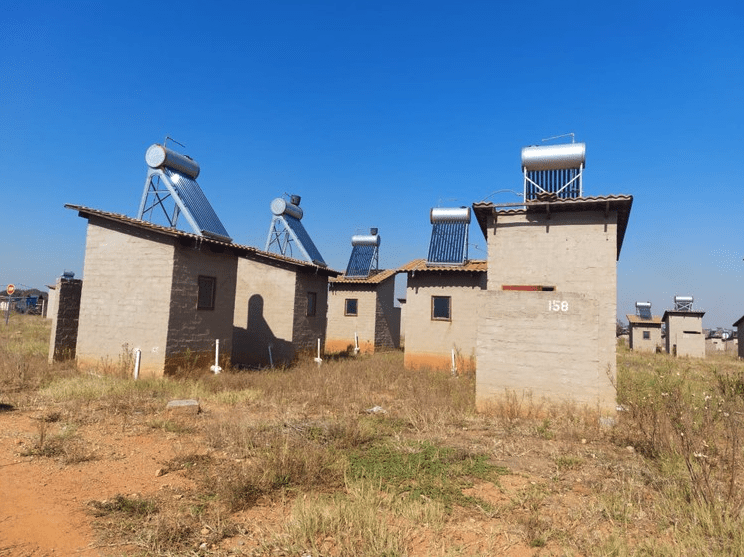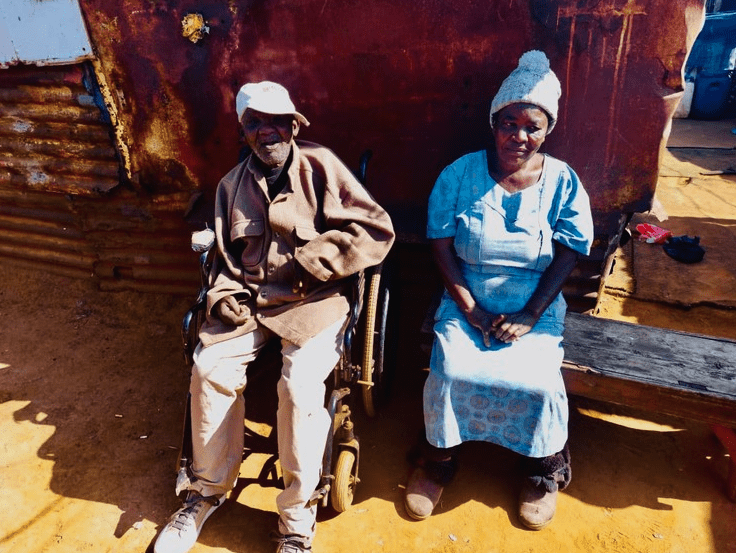
Serviced housing set up by the City of Ekurhuleni in 2016 remains vacant as people who were promised housing refuse to move. Photo: Kimberly Mutandiro
In a small fenced-in space in the Delmore informal settlement in Boksburg, Ekurhuleni, 80-year-old wheelchair-user Freddie Frank and his partner Constance Mpinga live. They share the space with their children, who live in one shack, and tenants in two other shacks.
The family is among hundreds of people who say the government has reneged on promises to provide them housing.
Shanty residents have been protesting since July last year against the local government's plans to relocate them to serviced homes in the first phase of the Balmoral housing development. The homes, which will have toilets and solar-powered showers, are due to be handed over to beneficiaries in October.
The Balmoral Housing Development was aimed at benefiting families living in informal settlements in Boksburg, Ekurhuleni and surrounding areas, which together contain more than 3,000 shacks where people live in crowded spaces with little to no services.
According to local leaders, the development was meant to happen in three phases: in 2016 the local government started construction on Phase 1 of Balmoral, with Phases 2 and 3 to follow after the residents of Phase 1 had been relocated, since many of them live on land earmarked for the next phases.
The municipality has allocated R250 million for the stands to be serviced.
However, to date only 259 toilets have been constructed in the first phase of the project. The construction cost of each toilet, which consists of a toilet, sink, shower and solar hot water heater, is estimated to be about R30,000.
Families like Frank's from Delmore currently share communal chemical toilets and a few water standpipes. There is no electricity, so illegally installed electrical wires hang over the huts. As a result, the community has seen many fires over the years.
The couple have lived in the settlement since 1995 and say they have both been approved for subsidised government housing. They are refusing to move to serviced housing. They want RDP housing which caters for the needs of Frank, an elderly wheelchair user.
“I want my own home because life isn't easy,” said Frank, who can barely speak since suffering a stroke several years ago.

Another resident, Renet Dlamini, said she moved to Delmore with her husband in May 1994. She registered for RDP housing in 1996 and waited years for the Balmoral Housing Scheme to be announced.
Dlamini's children and grandchildren have built a hut in the couple's fenced-in garden, and when it rains it leaks, so she seals all the tiny holes with bubble gum.
“In July 2023, the city authorities said they would move us to a plot of land next to the toilets. I was surprised as there is no space. My shack is big. Where will my children and grandchildren live?” Dlamini asked.
“We're not moving to a toilet. What we want is a proper house,” Dlamini's daughter, Dudu Mbatha, said.
Community leader Joseph Mashabane said he had repeatedly asked the municipality why the project was taking so long to complete. He said he had also appealed to the Department of Civil Protection for help, but to no avail.
“We have heard a lot but after two mayors we still have no answers. A lot of money has been spent on poor quality toilets and the municipality refuses to take responsibility. We won't move until we get a decent house,” Mashabane said.
City spokesperson Zweli Dlamini confirmed that the project began with the construction of 259 service stations in June 2016. “The development is an informal settlements improvement project. Construction of the superstructures for eligible beneficiaries will commence as soon as funding from the national and provincial human settlements departments becomes available,” he said.
Dlamini said about 3,800 buildings in informal settlements were targeted for de-densification in development phases 2 and 3. “Water and sewerage systems are being constructed but a large proportion of the settlements will need to be relocated to carry out work in the area,” he added.
“Completion of the project will be heavily dependent on communities continuing to modify the town layout and develop alternative land where necessary,” Dlamini said.

